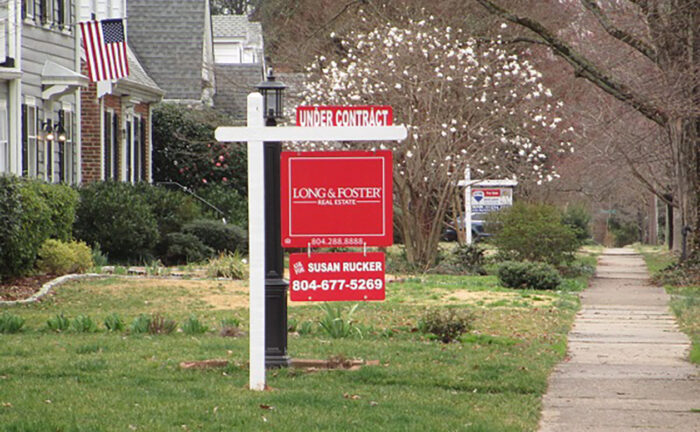
Effects from a recent class action settlement are expected to reach Richmond’s real estate market this summer. (BizSense file)
The apparent resolution of a yearslong legal battle that’s rocked the U.S. residential real estate industry is expected to have impacts on agents in metro Richmond, though to what extent remains to be seen, local observers say.
The National Association of Realtors announced Friday it had reached a $418 million settlement of claims brought by a group of home sellers in Missouri who argued that commissions for member agents had been artificially inflated.
The settlement, which is subject to court approval, includes an agreement by NAR to change its rules on how brokers are compensated. The change is expected to affect the traditional 6 percent commission that is typically paid by the home seller and shared between the seller’s agent and the buyer’s agent.
Observers say a result could be a reduction in the amount of commission paid to buyer’s agents in particular, and potentially a reduction in use of buyer’s agents overall, adding challenges to an industry that had become more crowded with the hot housing market that came with the pandemic.
Specifically, NAR’s rule change prohibits broker compensation offers on association-owned MLS systems, like the Central Virginia Regional Multiple Listing Service.
In a statement Friday, Laura Lafayette, CEO of CVRMLS and the Richmond Association of Realtors, acknowledged NAR’s efforts to settle the class action lawsuit and noted steps that the local groups had already taken last month to make its own policy changes in anticipation of the settlement.
“Prior to the announcement of this proposed settlement, CVR MLS eliminated the requirement of a mandatory offer of compensation from the listing agent to the buyer’s agent,” Lafayette said in the statement.
She said the group also modified its listing agreement “to provide greater clarity and transparency to the seller about the choices they can make regarding whether to offer compensation to a buyer’s agent, and if so, the amount of that compensation.”
“If the court approves the settlement — a process that could take several months — we do anticipate it will lead to changes in the real estate industry,” she said, adding that the groups would support members through those changes.
What those changes could amount to in the metro Richmond market and for the 5,800 agents who use CVRMLS remains to be seen. Heads of brokerages that do business in the market provided varying viewpoints on how things could play out, but agreed that ultimately time will tell.
“It is too early to determine how it could affect Realtors and consumers, but no matter what changes, agents will continue to play a critical role in the homebuying and selling process,” said Patrick Bain, CEO of Long & Foster Cos., which has 13 offices in metro Richmond and is headquartered in Chantilly.
“It’s important to note this is still preliminary,” Bain said, adding that the settlement remains subject to not only court approval but a subsequent objection period by class members and potential interest by the U.S. Department of Justice.
The settlement could be finalized this summer, with the changes taking effect in mid-July. Should that occur, Bain said the most notable practices to be impacted will be the requirement of a written representation agreement between all buyers and agents – a practice already required in Virginia, he said – and the removal of the compensation offer on MLSs for buyer’s agents.
“Cooperative compensation (commission) would remain permissible,” Bain said in an email, “however, the MLS would no longer include a data field for sellers and listing agents to make this offer to a buyers’ agent. Instead, it would be agreed to separately between brokers, as authorized by the seller, or buyers could pay their own agent.”
Susan Swink of Compass Real Estate, one of seven national brokerages that are defendants in the lawsuits, emphasized that the settlement does not prohibit sellers or listing agents from offering a commission to a buyer’s agent, but rather “removes the requirement for this offering to be upfront in the MLS.”
“Sellers wishing to tap into a wider pool of qualified buyers for their home can still offer a commission to a buyer’s agent through their listing agent’s marketing efforts outside of the MLS,” said Swink, managing broker for Compass’s Richmond Metropolitan Market. “Additionally, sellers retain the option to provide a closing cost credit in the MLS, which buyers can use to cover their agent’s commission.”
Swink also noted the signed agreement requirement between buyers and their agents, a change she agreed is aimed at promoting transparency of commissions from the outset.
“Experienced agents in the Richmond area, adept at guiding clients through the complexities of the real estate process, will continue to help their clients as they always have,” she said. “The settlement doesn’t fundamentally alter the landscape, and agents can still receive compensation for assisting buyer clients. The settlement’s provisions actually suggest that the current business model remains intact.”
Rick Jarvis, co-founder of One South Realty Group, a local brokerage that’s now part of Chantilly-based Samson Properties, said the NAR settlement is more about how agents are paid and who pays them, whereas how much agents are paid “is a function of market conditions.”
Where the buyer’s market that followed the 2008 economic downturn brought higher commissions and other perks to attract offers from buyer’s agents, Jarvis said today’s seller’s market was already causing a slight compression in commissions before the class action lawsuit, known as the Sitzer-Burnett case.
“A lot of the news coverage and political stuff is trying to paint a picture that commissions are going to fall because of the settlement, which really isn’t the case,” Jarvis said. “Commissions are a marketplace like any other product or service, and subject to market forces.”
Complicating the issue, Jarvis added, is the number of agents in the market, which in NAR’s case jumped by 100,000 members in 2021 and totals more than 1.5 million across the country.
Jarvis said he expects more agents, as well as brokerages, will exit the industry as the commission changes play out.
“It always happens. Just look at NAR membership in 2005-6. When the market spikes, agents jump in the business, and when the transaction count falls, agents leave,” he said.
“Right now, too many agents are chasing too few deals, and that is what will push commission rates down more than anything,” he said in an email. “And yes, I would expect significant agent (and brokerage) attrition in the next 18-24 months, unless transaction count spikes, and I don’t see that happening.”
Jarvis said the real issue facing the industry going forward is housing inventory – particularly of so-called affordable or entry-level houses. He thinks the Richmond region could face a housing shortage for at least a decade.
“The bottom line is we need housing to satisfy the demand created by the record-setting inbound migration,” Jarvis said of the trend of out-of-towners moving to the Richmond region in the pandemic-induced work-from-home era. “And it’s not that we just need more houses; we need more affordable/entry-level houses, and we need thousands of them.”
Because the cost to sellers to pay agents’ commissions has been typically worked into a home’s sale price, one of the arguments made in the class action suit is that the practice has driven up prices, putting more homes out of reach of first-time or lower-income homebuyers.
Jarvis doesn’t buy that argument.
“I think there is a false narrative around commission and house prices and that this settlement will somehow decrease the prices of housing. I wouldn’t hold my breath,” Jarvis said. “Commissions aren’t the reason that housing is expensive; housing is expensive because buyers significantly outnumber sellers. Want cheaper housing? Build more of it. A lot more.”
Lafayette, the Richmond Realtors CEO, agreed that affordability will remain a top concern as the changes play out and commissions are “decoupled.”
“Our concern has always been that buyers who most need representation — first time home buyers — will be the buyers least able to afford to pay their representatives/agents,” Lafayette said in an email.
Adding that RAR and CVRMLS have spent years working to create more opportunities for first-time home buyers and help close wealth gaps through homeownership, she said, “We want to remove hurdles to home ownership not erect them.”

Effects from a recent class action settlement are expected to reach Richmond’s real estate market this summer. (BizSense file)
The apparent resolution of a yearslong legal battle that’s rocked the U.S. residential real estate industry is expected to have impacts on agents in metro Richmond, though to what extent remains to be seen, local observers say.
The National Association of Realtors announced Friday it had reached a $418 million settlement of claims brought by a group of home sellers in Missouri who argued that commissions for member agents had been artificially inflated.
The settlement, which is subject to court approval, includes an agreement by NAR to change its rules on how brokers are compensated. The change is expected to affect the traditional 6 percent commission that is typically paid by the home seller and shared between the seller’s agent and the buyer’s agent.
Observers say a result could be a reduction in the amount of commission paid to buyer’s agents in particular, and potentially a reduction in use of buyer’s agents overall, adding challenges to an industry that had become more crowded with the hot housing market that came with the pandemic.
Specifically, NAR’s rule change prohibits broker compensation offers on association-owned MLS systems, like the Central Virginia Regional Multiple Listing Service.
In a statement Friday, Laura Lafayette, CEO of CVRMLS and the Richmond Association of Realtors, acknowledged NAR’s efforts to settle the class action lawsuit and noted steps that the local groups had already taken last month to make its own policy changes in anticipation of the settlement.
“Prior to the announcement of this proposed settlement, CVR MLS eliminated the requirement of a mandatory offer of compensation from the listing agent to the buyer’s agent,” Lafayette said in the statement.
She said the group also modified its listing agreement “to provide greater clarity and transparency to the seller about the choices they can make regarding whether to offer compensation to a buyer’s agent, and if so, the amount of that compensation.”
“If the court approves the settlement — a process that could take several months — we do anticipate it will lead to changes in the real estate industry,” she said, adding that the groups would support members through those changes.
What those changes could amount to in the metro Richmond market and for the 5,800 agents who use CVRMLS remains to be seen. Heads of brokerages that do business in the market provided varying viewpoints on how things could play out, but agreed that ultimately time will tell.
“It is too early to determine how it could affect Realtors and consumers, but no matter what changes, agents will continue to play a critical role in the homebuying and selling process,” said Patrick Bain, CEO of Long & Foster Cos., which has 13 offices in metro Richmond and is headquartered in Chantilly.
“It’s important to note this is still preliminary,” Bain said, adding that the settlement remains subject to not only court approval but a subsequent objection period by class members and potential interest by the U.S. Department of Justice.
The settlement could be finalized this summer, with the changes taking effect in mid-July. Should that occur, Bain said the most notable practices to be impacted will be the requirement of a written representation agreement between all buyers and agents – a practice already required in Virginia, he said – and the removal of the compensation offer on MLSs for buyer’s agents.
“Cooperative compensation (commission) would remain permissible,” Bain said in an email, “however, the MLS would no longer include a data field for sellers and listing agents to make this offer to a buyers’ agent. Instead, it would be agreed to separately between brokers, as authorized by the seller, or buyers could pay their own agent.”
Susan Swink of Compass Real Estate, one of seven national brokerages that are defendants in the lawsuits, emphasized that the settlement does not prohibit sellers or listing agents from offering a commission to a buyer’s agent, but rather “removes the requirement for this offering to be upfront in the MLS.”
“Sellers wishing to tap into a wider pool of qualified buyers for their home can still offer a commission to a buyer’s agent through their listing agent’s marketing efforts outside of the MLS,” said Swink, managing broker for Compass’s Richmond Metropolitan Market. “Additionally, sellers retain the option to provide a closing cost credit in the MLS, which buyers can use to cover their agent’s commission.”
Swink also noted the signed agreement requirement between buyers and their agents, a change she agreed is aimed at promoting transparency of commissions from the outset.
“Experienced agents in the Richmond area, adept at guiding clients through the complexities of the real estate process, will continue to help their clients as they always have,” she said. “The settlement doesn’t fundamentally alter the landscape, and agents can still receive compensation for assisting buyer clients. The settlement’s provisions actually suggest that the current business model remains intact.”
Rick Jarvis, co-founder of One South Realty Group, a local brokerage that’s now part of Chantilly-based Samson Properties, said the NAR settlement is more about how agents are paid and who pays them, whereas how much agents are paid “is a function of market conditions.”
Where the buyer’s market that followed the 2008 economic downturn brought higher commissions and other perks to attract offers from buyer’s agents, Jarvis said today’s seller’s market was already causing a slight compression in commissions before the class action lawsuit, known as the Sitzer-Burnett case.
“A lot of the news coverage and political stuff is trying to paint a picture that commissions are going to fall because of the settlement, which really isn’t the case,” Jarvis said. “Commissions are a marketplace like any other product or service, and subject to market forces.”
Complicating the issue, Jarvis added, is the number of agents in the market, which in NAR’s case jumped by 100,000 members in 2021 and totals more than 1.5 million across the country.
Jarvis said he expects more agents, as well as brokerages, will exit the industry as the commission changes play out.
“It always happens. Just look at NAR membership in 2005-6. When the market spikes, agents jump in the business, and when the transaction count falls, agents leave,” he said.
“Right now, too many agents are chasing too few deals, and that is what will push commission rates down more than anything,” he said in an email. “And yes, I would expect significant agent (and brokerage) attrition in the next 18-24 months, unless transaction count spikes, and I don’t see that happening.”
Jarvis said the real issue facing the industry going forward is housing inventory – particularly of so-called affordable or entry-level houses. He thinks the Richmond region could face a housing shortage for at least a decade.
“The bottom line is we need housing to satisfy the demand created by the record-setting inbound migration,” Jarvis said of the trend of out-of-towners moving to the Richmond region in the pandemic-induced work-from-home era. “And it’s not that we just need more houses; we need more affordable/entry-level houses, and we need thousands of them.”
Because the cost to sellers to pay agents’ commissions has been typically worked into a home’s sale price, one of the arguments made in the class action suit is that the practice has driven up prices, putting more homes out of reach of first-time or lower-income homebuyers.
Jarvis doesn’t buy that argument.
“I think there is a false narrative around commission and house prices and that this settlement will somehow decrease the prices of housing. I wouldn’t hold my breath,” Jarvis said. “Commissions aren’t the reason that housing is expensive; housing is expensive because buyers significantly outnumber sellers. Want cheaper housing? Build more of it. A lot more.”
Lafayette, the Richmond Realtors CEO, agreed that affordability will remain a top concern as the changes play out and commissions are “decoupled.”
“Our concern has always been that buyers who most need representation — first time home buyers — will be the buyers least able to afford to pay their representatives/agents,” Lafayette said in an email.
Adding that RAR and CVRMLS have spent years working to create more opportunities for first-time home buyers and help close wealth gaps through homeownership, she said, “We want to remove hurdles to home ownership not erect them.”







The realtors comments, especially Patrick Bain and Susan Swink’s, are pathetic. Patrick, the law is passed and it will be approved. Susan, the buyers agent has never brought much value to the table for a 3% commission and the greed has finally caught up to real estate agents. Everyone is happy about this new law, except agents, and it shows from their comments in this article.
Agreed, this is the experience I typically hear about. The number of “multiple offers” and “sold in 1 day” signs in our neighborhood also support that.
Your comments are spot on.
Look up Va Association of Realtors “code of ethics” realtors supposedly represent.
Of course. I wouldn’t expect any other response from those interviewed other than “most folks would be living in a soggy box by the river if a buyers agent wasn’t with them in spirit, while the buyer had already found their own house online.” Maybe next this will mean a class action against the VADA. Nothing says I am facing certain peril unless I have the support of a physical VA car dealer to buy my car online. I may be able to book a trip to Nepal online, train with Peloton in my basement, hire a guide on my… Read more »
Not much value? How about a qualified buyer so you can sell your home?
Commercial real estate brokerage began this change ten years or so ago. Very few commercial transactions provide the buyers representative with a built in commission today, and commission rates are competitively negotiated between houses for prize listings. It’s a model that is used world-wide. The days of automatic 6-10% commissions on land and investment sales are long gone, but its still a good way to make a buck for a smart hardworking agent. A recent presentation by a national consultant showed that the area is short approximately 12,000 housing units, which would be sold within 6 months if they magically… Read more »
as always, very intelligent points.
I think resi will become more like CRE, and will be better for it
The commission umbrella is gone and that will cause a shakeup to be sure. In a growing metro like Richmond the impact will be more muted than in slower growth areas and the better agents will be less affected than the marginal agent that will likely have to find another way to make a living. To me, all that is far less interesting than exploring what we’ve done as a society to cause supply of housing to fall so short of demand? Minimum lot sizes, minimum materials, ever increasing EPA requirements and the like might sound good in isolation but in the… Read more »
Anyone who has dealt with the city of richmond permitting office can tell you they make it functionally impossible to build in the city. A year long permit process isn’t even slightly unusual. And that’s leaving out the fact that zoning in the city actively prohibits density currently. The Fan and MD are illegal to build as they stand. Yes, you can battle your way through. And you have to charge much more to make up for it. And many contractors, especially the good ones with plenty of work, just refuse to work in the city as it’s too much… Read more »
“Anyone who has dealt with the city of richmond permitting office can tell you they make it functionally impossible to build in the city” So is Scotts Addition in Henrico?
I believe some of Scott’s Addition is in Henrico. Most of it is in Richmond, though.
It’s in the City. Westwood, the area west of I-95 is in the County.
HBAR and its MF Council have worked with the Stoney administration for 7 years and have seen a lot of success in making the permitting process more efficient. In fact, it’s probably faster to get approvals in the City than in Chesterfield County, the real laggard for cooperation in the region. Certainly, height restrictions in the Fan and MDA contribute to lower density construction.
“It’s important to note this is still preliminary.”
– Long & Foster CEO Patrick Bain
Well, Patrick, it’s important to note that this law is a result of homebuyers and sellers being fed up with agents like you. The days of agents doing little to nothing for a 3% cut are over.
“This is still preliminary.” lol
Too many real estate agents because of the generous commission structure.
None of the Realtors mention the possibility of _increased_ commissions. If Realtor services were truly competitive, and not a cartel, Relators who are, say, in the top ten percent, could negotiate more than they get now, maybe four or even five percent.
Brady – wrong!
You do not need to use a realtor to buy or sell a home; you need clear title from a real estate law firm. Most people do not realize this.
The need for a lower rate or fee is needed.
Imagine 1000 little deals with a small fee vs NOT.
commissions are going to fall. For 2 reasons. First of all, in a shortage, which we have, sellers are going to refuse to pay buyer’s agents. That will drive the functional commission down to 3%, as probably buyers agents will basically cease to exist as a thing, and we will go back to the 90s version of things. Which wasn’t any worse than the current system… 2d – the DOJ has made it clear they are determined to drive down US commissions, which are a multiple of other countries. If this doesn’t work they will try again. I think the… Read more »
Too many people that broke off into their OWN brokerage firms have been taking advantage of doing very very little work and squeezing too much money out of all of us for wayyyy too long. (the computer has been doing all the work for too long; realtors sitting by and waiting to “show” it to us and making bank)
Most people have been waiting for this decision for over a decade yet people act like this is new or not going to happen.
This is an excellent way to stimulate growth and prosperity.
I’m for anything that will diminish the frequency of the obligatory Dutch Angle realtor photo.
I never understood why this occupation has a thing for head shots.
The photo concept is about recognition since their clientele are consumers, not professionals. They need to be recognized in the neighborhood to drive them more business. I get that. That’s not necessary in commercial real estate. In fact, you get ridiculed if you do it.
Whatever the case may be, promise me you will be there to catch Susan as she falls backwards from my phone.
The people who think they don’t need a realtor to buy the largest purchase they will likely ever make, clearly have never had a realtor that knows what they are talking about. Rate buy downs, chimney inspections, addendums, well and septic inspections. You don’t know what you don’t know. Similar to insurance. No one needs it, until they do.
Some people may feel they don’t need one, others, like me, may feel they don’t deserve an automatic +$21k payday for representing a buyer.
So how would you propose they do get paid? That’s a legitimate question. I think this will be a good shake up for the industry and there is a lot to iron out.
You don’t pay a surgeon any different if your surgery is easy or difficult. You pay for their ability and knowledge to handle the situation if it gets messy.
I think this will push out all the agents that are the reason people don’t think they need agents which will be a good thing.
I am not sure why realtors are even needed in this day and age for personal homes; they are essentially in the same category as a travel agent at this point.
In a market like this where homes are selling immediately with multiple buyers offering over asking, it is not necessary. Anyone can list their house themselves online and use a real estate lawyer to do the paperwork and take care of the rest.
These commissions are not necessary anymore.